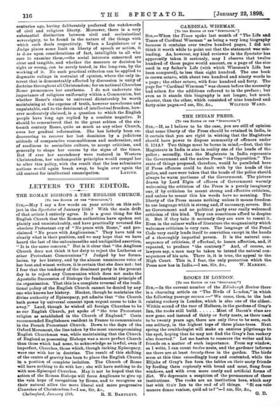THE INDIAN PRESS.
[TO THE EDITOR OF THE "SPECTATOR."]
SIR,—If, as I believe to be the case, you are still of opinion that some liberty of the Press should be retained in India, is. it certain that you are right in wishing that the Magistrate should have power to dispose summarily of offences under S. 124AP Two things must be borne in mind,—first, that the Magistrate in India is also in reality one of the heads of the police ; secondly, that the Magistrate in India represents the Government and the native Press "the Opposition." The state of things proposed, therefore, would be paralleled here- if Press offences could be dealt with by the heads of the police, and care were taken that the heads of the police should. always be warm partisans of the Government. The picture drawn by Lord Elgin of officers of Government warmly welcoming the criticism of the Press is a purely imaginary one, if by criticism he meant strong and effective criticism,. and unless he meant this his words have no meaning. The- liberty of the Press means nothing unless it means freedom to use language which is strong and, if necessary, severe. But no Government and no political party ever really welcomed criticism of this kind. They can sometimes afford to despise- it. But if they take it seriously they are sure to resent it.. Even in the calmer walks of literature the magnanimity which welcomes criticism is very rare. The language of the Penal Code very easily lends itself to conviction except in the hands of a thoroughly impartial person. It is the natural con- sequence of criticism, if effectual, to lessen affection, and, if repeated, to produce "the contrary." And, of course, as- lawyers say, a man may be taken to intend the natural con- sequences of his acts. There is, it is true, the appeal to the High Court. This is, I fear, the only protection which the
Press now has in India.—I am, Sir, &c., W. MARKBY.






































 Previous page
Previous page